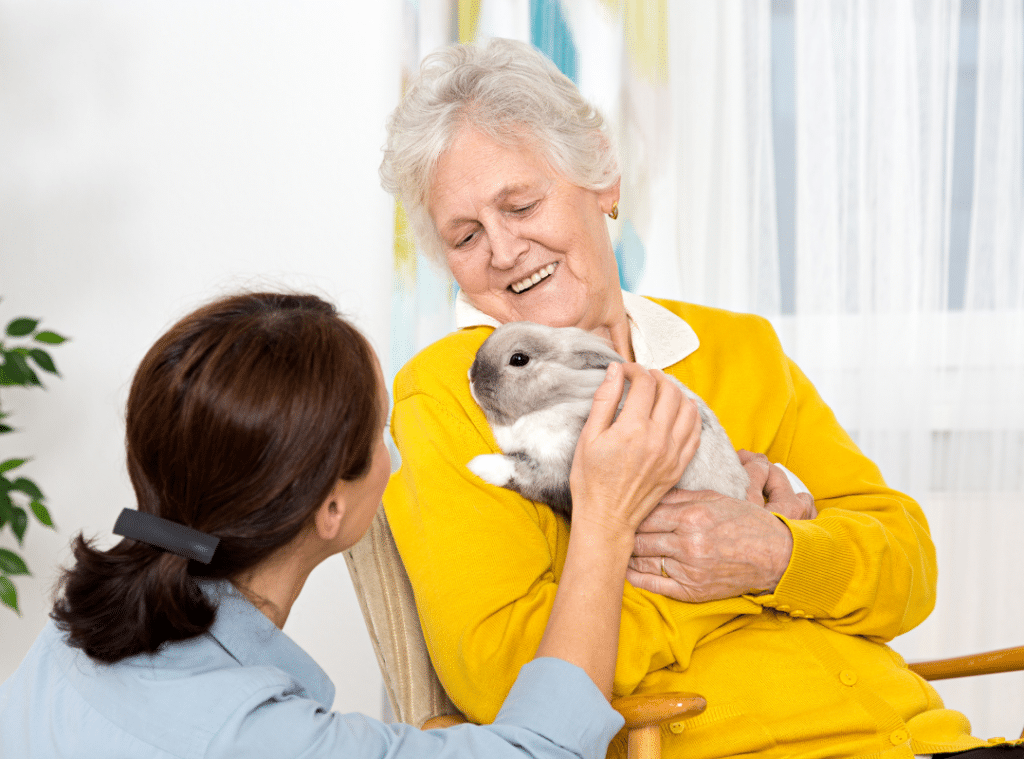Assisted Living Pets Allowed: Benefits of Pet-Friendly Senior Living
In the domain of senior living, the presence of pets in assisted living facilities, such as Westmont of Encinitas, significantly impacts the residents’ lives. The companionship and support offered by these furry friends go beyond mere interaction; they become integral to seniors’ emotional and physical well-being. Pets in senior living spaces create a unique environment that promotes joy and fulfillment by fostering a sense of purpose and connection. But how exactly do these four-legged companions contribute to such a transformative experience for residents?
Mental Health Benefits
Discover the profound impact that having pets in assisted living facilities can have on the mental well-being of residents. The cognitive stimulation and emotional bonding that pets provide offer a sense of mental stimulation and psychological comfort to those in senior living communities. Interacting with animals has decreased loneliness and depression while also boosting overall mood and morale. Additionally, engaging with pets can serve as an effective coping mechanism for seniors, helping combat depression and anxiety and promoting a sense of emotional well-being.
Physical Health Improvements
Having pets in assisted living can greatly improve your physical health. Caring for a pet can promote physical activity, such as walking a dog or playing with a cat, which can help increase your mobility and strength.
Additionally, pet companionship can reduce stress levels and contribute to lower blood pressure, benefiting overall physical well-being.
Mental Health Benefits
Exploring the mental health benefits and physical health improvements from having pets in assisted living can shed light on the profound impact these furry companions can have on residents’ overall well-being.
- Emotional Support: Pets provide unconditional love and companionship, offering a source of comfort and reducing feelings of loneliness or isolation.
- Mental Stimulation: Interacting with pets can keep the mind active and engaged, promoting cognitive function and mental agility.
- Stress Reduction: Petting a dog or cat can lower stress levels, decrease anxiety, and contribute to a sense of calm and well-being.
- Incorporating innovative therapies like animal-assisted intervention in pet-friendly senior living communities can further enhance residents’ mental well-being.
Having a pet in assisted living can bring immense joy and purpose to residents’ lives. The bond formed with a pet can create a sense of routine, responsibility, and connection, all essential for mental health.
Pets can uplift spirits, provide a listening ear, and offer unwavering companionship, making them invaluable members of any senior living community.
Increased Social Interaction
Amidst the tranquil setting of assisted living communities, the presence of pets not only fosters emotional well-being but also plays an important role in enhancing physical health through increased social interaction. Pet therapy has been proven to have numerous benefits, including reducing stress, lowering blood pressure, and improving overall physical health. When seniors interact with pets, they experience a boost in mood and a reduction in loneliness and isolation. Additionally, the companionship of pets encourages physical activity among seniors, leading to improved cardiovascular health and overall well-being.
Sense of Purpose and Routine
Residents in assisted living facilities who are allowed to have pets often experience a renewed sense of purpose and routine. Having a furry companion by your side can bring structure to your day and a fulfilling sense of responsibility. Here are three ways pets can enhance your sense of purpose and routine:
- Daily Routine: Caring for a pet creates a daily structure that can be comforting and grounding. From feeding and walking your pet to grooming and playtime, these activities provide a sense of order and purpose to your day. Pets also offer companionship, independence, and compassionate care.
- Responsibility: Owning a pet comes with responsibilities that can give you a sense of accomplishment. Knowing that your pet relies on you for their care can motivate you to stick to a routine and prioritize their well-being.
- Purposeful Interactions: Pets offer constant companionship and opportunities for meaningful interactions. Whether it’s a gentle pat on the head or a playful game, these moments can fill your day with joy and purpose.
Embracing the companionship of a pet in assisted living can bring a renewed sense of purpose and structure to your life, enriching your overall well-being.

Social Connections and Companionship
With the companionship of pets in assisted living facilities, residents often find solace and comfort in the social connections and companionship these furry friends provide. Pets have a remarkable way of improving communication among residents. Whether it’s sharing stories about their pets, discussing pet care tips, or simply admiring each other’s furry companions, pets act as conversation starters and help residents connect on a deeper level. Building relationships becomes easier with pets around.
The shared responsibility of caring for a pet fosters teamwork and collaboration among residents, forming strong bonds based on a common love for animals. Loneliness is reduced as residents come together to interact with their pets and each other, creating a sense of community within the assisted living facility. The joy and laughter pets bring into residents’ lives create a warm, inviting atmosphere where relationships flourish and communication flows freely. Companionship with pets enhances social connections and fosters a sense of community, empowering residents.

Reduced Stress and Anxiety
Having pets in assisted living can greatly reduce your stress and anxiety levels. Their calming companionship can offer a sense of security and comfort during challenging times. Additionally, studies have shown that animal interactions can improve mental well-being and emotional support.
Calming Companionship Benefits
Feeling stressed or anxious can be overwhelming, but the presence of a calming companion can make a significant difference in your daily life. Pets in assisted living offer more than just emotional bonding; they provide tangible relaxation benefits that can ease your worries and bring peace to your heart.
Here are three ways in which the calming companionship of pets can reduce stress and anxiety:
- Physical Touch: Simply petting a furry friend can trigger the release of oxytocin, the “cuddle hormone,” which promotes feelings of trust and reduces stress levels.
- Routine and Structure: Caring for a pet can establish a sense of routine in your day, adding predictability and stability that can alleviate anxiety.
- Distraction and Play: Engaging with a pet through play and interaction can redirect your focus away from worries, offering moments of joy and lightness in your day.
Emotional Support Benefits
Pet therapy in assisted living facilities has been shown to provide significant emotional support benefits for residents, effectively reducing stress and anxiety levels. The comforting presence of a furry friend can work wonders in alleviating the feelings of loneliness and isolation that often accompany aging. Pets offer unconditional love, creating a bond that brings joy and a sense of purpose to seniors in assisted living. Their soothing presence can help calm your mind, lower blood pressure, and reduce feelings of anxiety.
Petting a dog or cat can release feel-good hormones like oxytocin and serotonin, promoting well-being. This emotional connection with a pet can distract you from worries and daily stresses, allowing you to focus on the present moment and find solace in their companionship. Having a pet around can bring smiles, laughter, and a sense of fulfillment to your days, making the assisted living environment feel more like a true home filled with love and understanding. Music therapy sessions with pets foster community and well-being through shared experiences.
Therapeutic Interactions Benefits
Amidst the challenges of everyday life in an assisted living facility, therapeutic interactions with pets can serve as a beacon of comfort and support for residents, particularly in reducing stress and anxiety levels. Pets can forge deep emotional connections with humans, offering unconditional love and companionship that greatly alleviate feelings of loneliness and isolation in seniors. Interacting with pets can stimulate cognitive functions in seniors, from recalling feeding schedules to engaging in playful activities; these interactions help keep the mind active and sharp, ultimately contributing to enhancing cognitive functions like memory and problem-solving.
Enhanced Overall Well-being
Experience a profound transformation in your overall well-being through the enriching presence of pets in assisted living facilities. The emotional comfort pets provide can offer solace during challenging times, easing loneliness and providing a sense of companionship. A furry friend’s unconditional love and friendship can brighten your days and uplift your spirits, fostering a deep sense of emotional well-being. Engaging with pets can also provide mental stimulation through interactive activities such as playing, grooming, and training, similar to the Quail foraging activities at Oceanview Senior Living. These interactions with pets can help keep your mind active, improve cognitive function, and boost your overall mental well-being. Engaging with pets can provide a sense of purpose and responsibility, enhancing your quality of life and overall fulfillment.
To sum up, having pets in assisted living facilities at Westmont of Encinitas is like having sunshine on a cloudy day. They bring residents warmth, comfort, and a sense of purpose, promoting mental and physical well-being. The companionship and joy pets provide create a sense of community and connection, reducing loneliness and anxiety. Embrace the benefits of pet-friendly senior living at Westmont of Encinitas and experience the love and happiness that furry friends bring into your life. Contact us at 760-452-6037 to learn more.
Dive into the vibrant life our Westmont communities have to offer.Find Where You Belong
FAQs
Are cats allowed in care homes?
Yes, many care homes and assisted living facilities welcome cats. Cats are low-maintenance companions that provide emotional comfort and reduce stress levels for residents. However, each facility may have specific pet policies, so it’s best to inquire about their guidelines.
What three key challenges should be considered when looking at an assisted living facility?
When choosing an assisted living facility, consider these three challenges:
- Pet Policies: Ensure the facility allows pets if bringing one is a priority.
- Cost and Affordability: Review pricing structures and financial assistance options.
- Social and Medical Support: Assess the facility’s level of care and community engagement.
How long does it take for the elderly to adjust to assisted living?
Adjustment periods vary but typically take between 1 to 3 months. Seniors may need time to adapt to new routines, form social connections, and feel comfortable in their surroundings. Facilities that emphasize personal preferences and offer pet-friendly options can significantly ease this transition.








